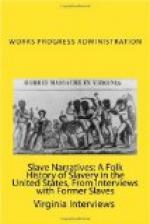Mrs. Cave remembered seeing General Woolford and General Morgan of the Southern forces when they made friendly visits to the plantation. She saw General Grant twice during the war. She saw soldiers drilling near the plantation. Later she was caught and whipped by night riders, or “pat-a-rollers”, as she tried to slip out to negro religious meetings.
Mrs. Cave was driven from her plantation two years after the war and came to Carrollton [TR: earlier, Carrolton] Kentucky, where she found her mother and soon married James Cave, a former slave on a plantation near hers in Taylor county. Mrs. Cave had thirteen children.
For many years Mrs. Cave has lived on a farm about two and one half mi. south of Rising Sun. Everything she had was washed away in the flood and she lived in the court house garage until her home could be rebuilt.
Federal Writers’ Project
of the W.P.A.
District #8
Marion County
Anna Pritchett
1200 Kentucky Avenue
Folklore
Mrs. Harriet Cheatam—ex-slave
816 Darnell Street
Interviewer’s Comment
Incidents in the life of Mrs. Cheatam as she told them to me.
Interview
“I was born, in 1843, in Gallatin, Tennessee, 94 years ago this coming (1937) Christmas day.”
“Our master, Martin Henley, a farmer, was hard on us slaves, but we were happy in spite of our lack.”
“When I was a child, I didn’t have it as hard as some of the children in the quarters. I always stayed in the “big house,” slept on the floor, right near the fireplace, with one quilt for my bed and one quilt to cover me. Then when I growed up, I was in the quarters.”
“After the Civil war, I went to Ohio to cook for General Payne. We had a nice life in the general’s house.”
“I remember one night, way back before the Civil war, we wanted a goose. I went out to steal one as that was the only way we slaves would have one. I crept very quiet-like, put my hand in where they was and grabbed, and what do you suppose I had? A great big pole cat. Well, I dropped him quick, went back, took off all my clothes, dug a hole, and buried them. The next night I went to the right place, grabbed me a nice big goose, held his neck and feet so he couldn’t holler, put him under my arm, and ran with him, and did we eat?”
“We often had prayer meeting out in the quarters, and to keep the folks in the “big house” from hearing us, we would take pots, turn them down, put something under them, that let the sound go in the pots, put them in a row by the door, then our voices would not go out, and we could sing and pray to our heart’s content.”
“At Thanksgiving time we would have pound cake. That was fine. We would take our hands and beat and beat our cake dough, put the dough in a skillet, cover it with the lid and put it in the fireplace. (The covered skillet would act our ovens of today.) It would take all day to bake, but it sure would be good; not like the cakes you have today.”




